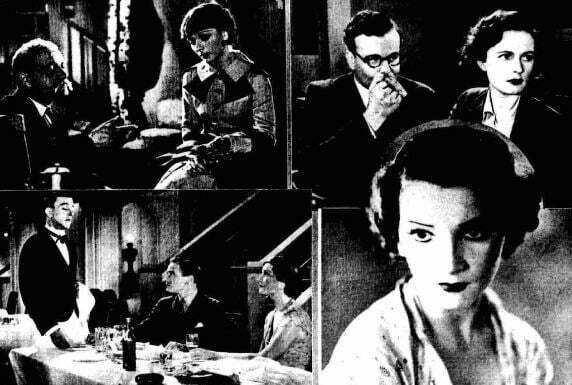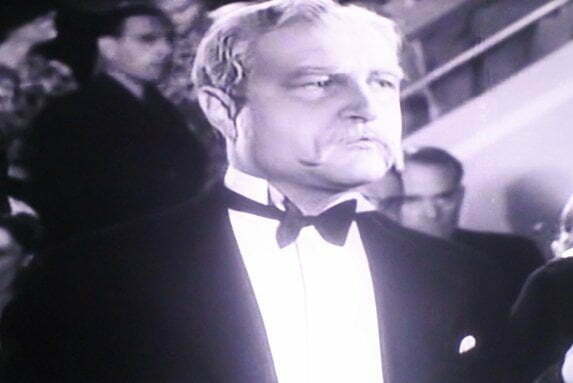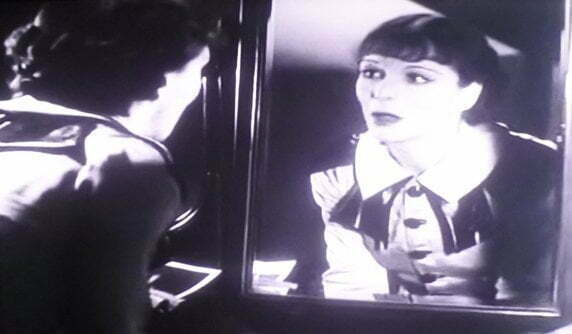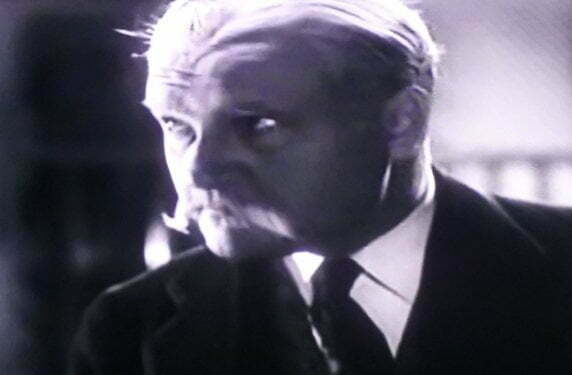
It was on again the other night. In these days of DVD and streaming services it can seem hard to think of the film that is difficult to find – as films once were, aside from current releases, when you had to search long and far before tracking down that rarity of which you had read but had seen perhaps no more than a tantalising still. The film was Open All Night, a British film from 1934, which turned up on the schedules of vintage film and television channel Talking Pictures TV at the challenging hour of 2:50am. But once a film has become a part of your blood, then you must see it each time it recurs – to recover that sense you had when first you saw it and understood, to reaffirm some special sense of yourself. You have to make time for it.
I think I first saw the film in the late 1980s, when Alexander Walker, then film critic of the Evening Standard, noted its appearance in the TV schedules (again at some unsociable hour, as I recall), saying that here was something little-known that was worth waiting up for. As a budding aficionado of British 1930s films, and a shameless seeker out of the obscure, I needed no further prompting.
The film did not disappoint. A tragedy in miniature, everything about it denoted quality in straitened circumstances, a humble production from the ‘quota quickie’ era of British production that reached out to offer something more. It touched the heart.
I have seen the film a couple times more since, though not yet on a cinema screen, and then again on that Tuesday morning amid the advertisements for back pain relief, lottery tickets and bed mattresses – ironic in view of a scheduling time known only to insomniacs – that give Talking Pictures TV its special flavour. Presumably I was not the only viewer, even at ten to three in the morning, but it felt that way. The film had to be seen, and I was fulfilling my duty in seeing it.

Open All Night tells of a Russian grand duke, fallen in the world, who proudly serves as night manager at a London hotel, the Paragon. Anton, played by character actor Frank Vosper (surely his only leading role), is an expert manager of people, who puts his skills to solving the problems of two young couples over a night at the hotel, while dealing with the disappointment of having been given his notice when he had expected a promotion. One of the film’s distinguishing features is that it takes place entirely at night, practically in real time, weaving a number of narratives together that can only be resolved through the film’s tragic denouement.
The film was made at Twickenham Studios, run by enterprising producer Julius Hagen, who specialised in films made on the cheap, the notorious ‘quota quickies’ that were the product of a 1927 Act ruling that a certain proportion of films shown in British cinemas had to be British made. Hagen exploited the situation through distribution deals with US distributors and ruthless financial management. Economies were made by hiring old hands whom no one else would now employ as directors, such as the veteran George Pearson, director of Open All Night. Pearson writes in his autobiography of the strictures under which such films were made:
The usual budget for a ‘quickie’ was determined solely on length, based on a fixed charge of £1 per foot on screened film – hence the ‘quickies’ were sarcastically termed ‘Pound-a-Footers’. Their average length was between five and six thousand feet, enough for an hour of screen time sufficient for the Quota. To make a talking film with £6,000 only to meet the costs of studio space, subject, script, director, technicians, film stock, lights, artistes, overheads, and end up with a profit, needed a spartan economy and a slave-driving effort, for the time allotted on the floor was strictly limited to twelve days, less if possible!
Hagen economised further by making the studio available day and night – Pearson records that three of the eight ‘quickies’ he made there were shot at night. I’ve not been able to determine it for certain, but it would have been more than appropriate for Open All Night to have been made that way.
Despite the economies, there were talents on hand able to achieve the remarkable on next to nothing. Open All Night never looks anything other than humble, but the hotel sets are ingenious, including the foyer over which the many extras constantly mill, picked up by Pearson’s prowling mobile camera, and eye-catching staircases (movement up and down floors as a reflection of whether one is going up or down in society is one of the film’s motifs). The art director was James A. Carter, revered in the industry for his ability to conjure up small miracles. Pearson’s fellow ‘quickie’ director Bernard Vorhaus many years later recalled:
… the quite amazing art director Jimmy Carter, who managed to get an amazing quantity of sets over night … He had an amazing effective plaster department with a tremendous number of moulds. He would whip up scenes with elaborate plaster Tudor beams, trees, God knows what, which were quite out of proportion to the meagre resources in general.
Also working on the film were reliably efficient cinematographer Ernest Palmer, occasionally conjuring up striking compositions and with some interesting low-angle shots of the protagonists; editor Lister Laurance, a name not known to me, who shows great aplomb in building up the tempo between the interlocking stories as the tension mounts; and music director W.L. Tyrtel, notorious for routine scores that churned away in the background unaffected by change of scene or mood, but who does well in weaving his score alongside the unobtrusive band playing in the hotel.

So much for efficiency. What makes Open All Night something special? It starts with the story, which is credited to John Chancellor, a hack writer of crime and science fiction stories under numerous aliases, none quite as exotic as his real name, Ernest Charles de Balzac Willett. Some sources state the film came from a play, but it more likely to have been an outline or magazine story (George Pearson’s only mention of the film in his book is as a type of film that ‘were typical magazine stories .. hackneyed situations of conflict and comedy’). Whatever the source, it is practised screenwriter Gerard Fairlie who created an efficient scenario, if not one graced with too many memorable lines. The plot is intricate and meticulously worked out, with not a word wasted in taking things to their climax. One of the particular qualities of the film is how the figures involved are neatly imprisoned by narrative, lost people propelled by circumstances they cannot control.
The story revolves around Anton, whose fate recalls Emil Jannings in The Last Laugh (1924) as much as the setting suggests an economical Grand Hotel (1932) (Open All Night cheekily starts with a line about nothing ever happening at the Paragon, echoing the famous opening – and closing – line of Grand Hotel). Frank Vosper is superb. Whiskered-up to look thirty years older than his actual age of thirty-five, he excludes authority and vulnerability, enterprise and disillusionment all in one, effortlessly managing the human crises that come before him while being helpless in the face of those that beset him. It is only towards the end of the film, when someone has been found dead in the hotel and Anton is implicated that he tells a detective that he is a “grand duke of the Holy Russian Empire”, his bearing rising as he speaks the words that take him far above the petty world in which he finds himself. We are told nothing of his back story – he simply represents fallen greatness, and acceptance. In the film’s memorable final scene Anton returns to his Soho flat and toasts a portrait of Czar Nicholas II on his wall, before taking the only course of action that will solve the problems of the young people he is trying to save, and spare him shame, by shooting himself. So another of Open All Night‘s distinctive qualities is that it ends with the suicide of a character all in the film and all watching can only admire. Such is fate.

It is hard not to see in Anton a reflection of George Pearson himself. Pearson was a film veteran of twenty-two years, who entered the film industry in 1912, aged thirty-seven, only after a substantial career as a schoolteacher and headmaster. Something in the medium’s power to transmit a message spoke deeply to him when he gave up security to joined the British branch of Pathé as a director. He did not want to make educational films but rather story films that investigated the heart. His ambitions – eloquently expressed in his autobiography – were not always realised by his abilities, but he enjoyed a fair amount of success (especially with the 1920s Squibs series of films starring Betty Balfour) before finding himself left behind by the changing film world of the 1930s. Anton too, for all his goodness, is an abandoned figure, because time is no respecter of virtue. All he can do he can do is help out the young, knowing that they must leave him behind, because that is the way the story must go. Anton is Pearson the director, whether consciously or no, seeing how life must carry on, guiding as best he can, even as he guides himself out of the picture.

Then there are those young people. All have made a mistake in life: Maysie, the out-of-work chorus girl who befriends Anton (a sprightly, touching performance from Gillian Lind); sick wife Elsie and her young husband Bill (Margaret Vines and Lewis Shaw), whose desperation causes the accidental death that could have him accused of murder, until Anton writes a suicide note declaring that it was he who killed the man; and Jill (Geraldine Fitzgerald), guilty of petty theft, trapped between a “well-known weekend husband”, the lecherous Hilary (Michael Shepley) and her distraught waiter fiancé Henry (Colin Keith-Johnson).
None were well-known names; only Fitzgerald would have notable career thereafter, though Shepley became a familiar film character actor (Frank Vosper would die in mysterious circumstances in 1937). As with many performers in the ‘quickies’, they came fresh off the stage (sometimes literally so – they could be in the theatre in the evening and join the studio that night), hired by Twickenham because they were cheap. There is a lost air about them – going through the motions efficiently enough, not quite sure what story they were telling, victims of fate quite as much as their characters. The three young women in particular each have a look of forlorn hope, not seeking escape because what would be so different about what they were escaping to? (the grievously ill Elsie would rather listen to the hotel band playing than fall for her husband’s hopes).

There is splendid summary of fiction films attributed, from around this time, to Carl Koch, German film director and husband of Lotte Reiniger: “entertainment films are merely monstrous documentaries of actors at work”. One can apply this mischievous insight to any fiction film, of course (and probably all of us do so to some degree when watching any film, as we step back momentarily from the spectacle that would engulf us). But I find it particularly relevant to Open All Night. It is profoundly a film about itself. Its hapless young protagonists, inexpert in life, still finding their way in their profession, cannot find their way out of the hotel. They sit alone at tables, drinking champagne they cannot afford, as the indifferent crowd passes by. They need Anton, they need George, to steer them to the freedom their youth merits, even though it is he who must pay the price for this.

All films are about time. They cut up its flow and explore the effects of this distortion on humans. Open All Night establishes its particular dictate by taking place in near real-time, with no flashbacks and arguably no parallel action. The clock is ticking, just as it does for Pearson and his crew to make the film in twelve days at so many thousand feet and no more (Open All Night was filmed in July 1934, cut in August, released in October, its running time 62 minutes). The film will be shown in a cinema, cheap fodder to fill out an hour in the programme, an entertainment constrained by time, whose special appeal to the audience is that it may eliminate time entirely, or at least conquer it for a while. Open All Night is a tragedy to pass the time. Its ending therefore become entirely logical – its lead calling time on himself, before the dawn breaks and yet another day can begin.
Open All Night‘s protagonists are caught in story, because what else is there to make sense of chaos? They follow the lines, they keep to time, they make their exits only to start up all over again in the next play, the next film on the schedule. They understand that it is all a monstrous documentary, but how may they escape? Only Anton finds a way to end the story.
A version of this post is included in my book Let Me Dream Again: Essays on the Moving Image (Sticking Place Books, 2025)
Links:
- George Pearson moved on to the Colonial Film Unit, where he ended up its Director-in-Chief. He died in 1973, aged ninety-seven. His memoir Flashback: An Autobiography of a British Film Maker (1957) is a little fusty, but informative and inspiring, much like its author. I wrote his entry for the Oxford Dictionary of National Biography (subscription access only). I threw in some praise for Open All Night.
- There is a fine essay by Linda Wood on Julius Hagen and Twickenham Film Studios in Jeffrey Richards (ed.), The Unknown 1930s: An Alternative History of the British Cinema, 1929-1939 (1998). On quota quickies overall, see Steve Chibnall, Quota Quickies: The Birth of the British ‘B’ Film (2007)
- Open All Night is not available on DVD. It gained some good notices at the time – the Kinematograph Weekly praised it as being an “ingenious, colourful drama of London’s night life … refreshingly comprehensive and its appeal is addressed to all classes. Good popular booking”. After its initial US release (Variety called it: “good, average entertainment anywhere and not long enough to provoke much criticism”) it was re-issued there under the extraordinary, and quite misleading title Murder by Appointment.
- Carl Koch’s ‘monstrous documentaries’ line is recorded as a ‘Saying of the Month’ in World Film News and Television Progress, April 1936 (ironically opposite an article entitled ‘The Scandal of Quota’) and referred to in Dai Vaughan’s essay ‘A Light Not Its Own’ in his collection For Documentary (1999)
- Stills for Open All Night are few and hard to find. The screengrabs above come from the Talking Pictures TV broadcast.
Highly informative, as well as touching. There is indeed a vast lumber room of modest British features from the 30s and 40s which deserve being accessible to browse. Something of a scandal that no national body (the BFI?) has bothered to reclaim this vast hinterland, lying behind the fde familiar names and titles from these decades? But hurrah for channels like Talking Pictures and labels like Network which have filled the gap.
Thank you as ever Ian. Sometimes it feels good for a film to be elusive, just because of the triumph of tracking it down at last. But to be completely unavailable is ridiculous. Perhaps Renown will pick up on the title for one of their box sets. A ‘best of’ quota quickies set might be quite something: Open All Night, The Phantom Light, Dusty Ermine, They Drive by Night …
Hi Luke. That sounds like a remarkably good movie. I remember staying up late to catch movies that weren’t on at any other time. I was very excited when a new UHF station acquired a package with lots of obscure movies and they chose to run them at reasonable times.
When our local public broadcasting station would show a British movie, my mother always said that when she was a kid in the 40s that when an “English” movie started at the local theater, they would boo. I explained the concept of the Quota Quickie to her.
Hi Joe,
I expect a few people booed Open All Night (or Murder by Appointment in its reissue form) when it was shown in the US. But each time there was one person seated in the audience who thought, ‘Actually, that film had something’. It only takes one.